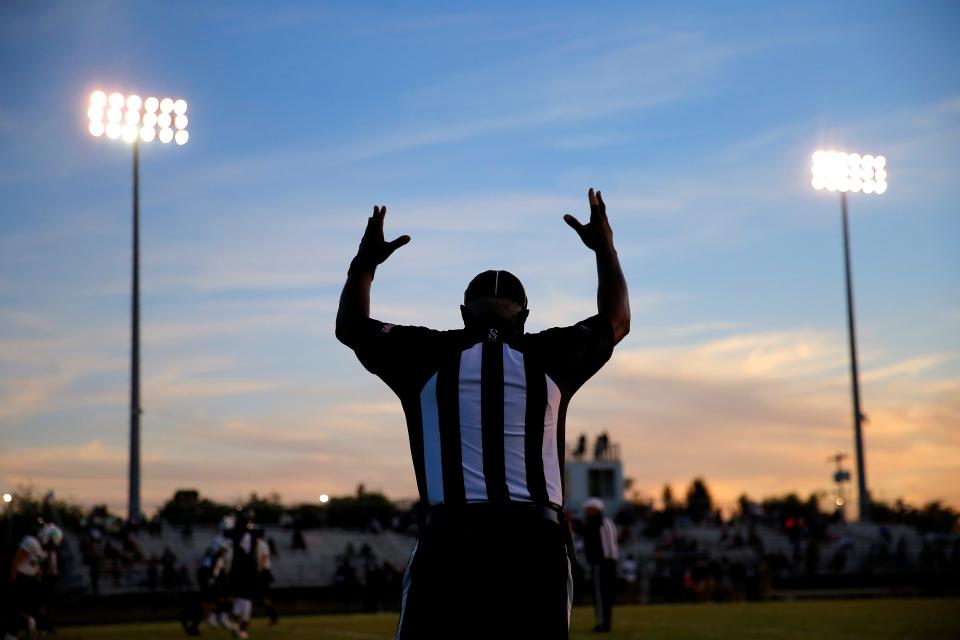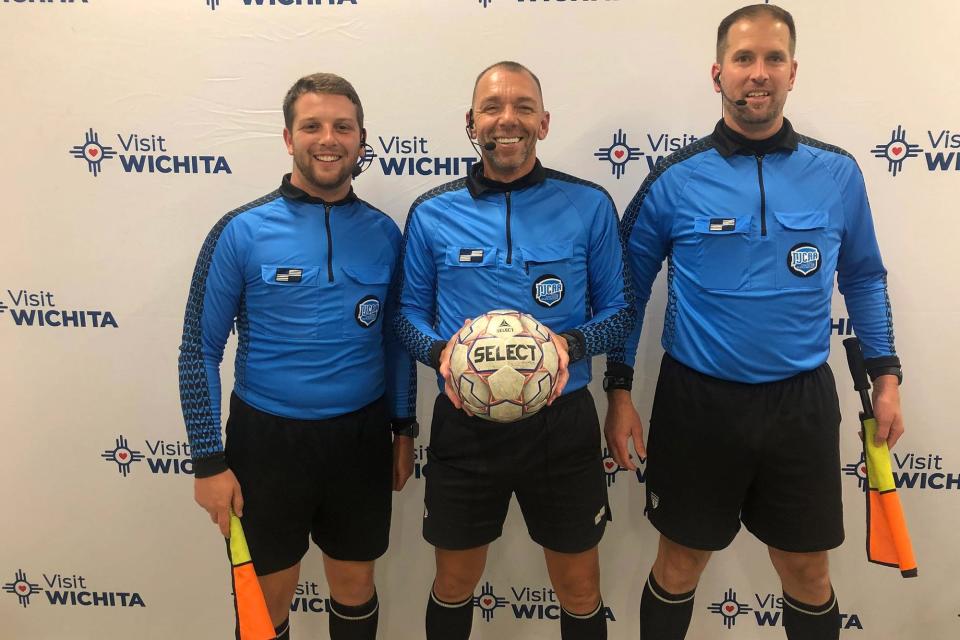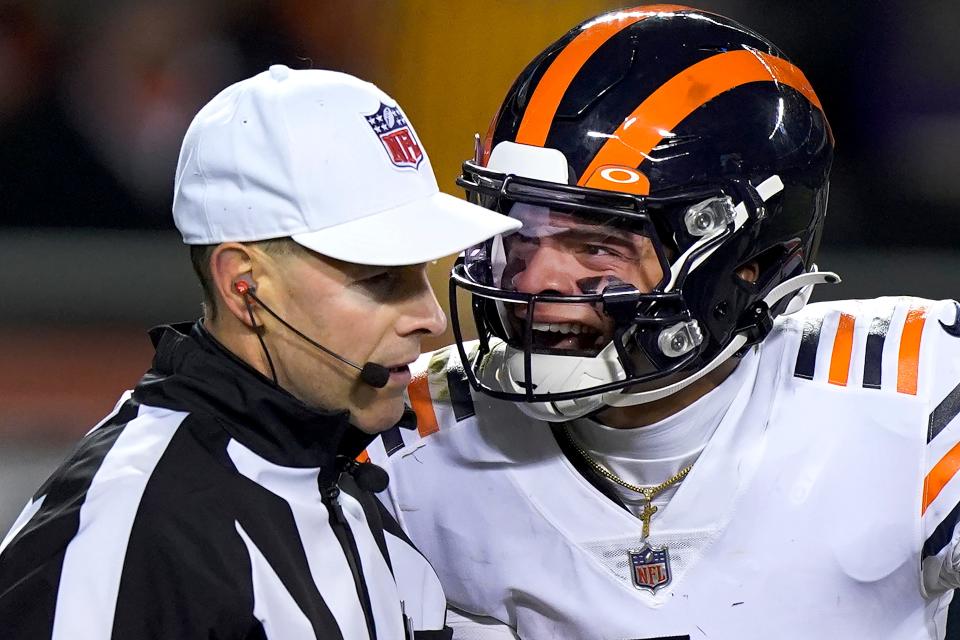Carlson: Don't put officials shortage on the back burner, Oklahoma. Now is the time for action.
A week or so ago, a ballot for one of our high school sports honor teams landed at Oklahoman headquarters.
Lots do this time of year, but an attached note from the coach on this one caught my eye. The coach wanted us to know the team hadn’t been able to play several games this season, and the reasons were listed matter of factly.
Bad weather and officials shortage.
In Oklahoma, we accept that there will be weather cancellations every spring. Storms roll in. Games get canceled. Happens all the time.
But to see this coach list officials shortage right alongside weather gave me pause.
Have we gotten to the point in Oklahoma high school sports where the shrinking number of officials, referees and umpires has caused the cancellation of so many games that it’s become expected? Routine? Normal?
Sadly, the evidence says yes.
No one knows that better than Brian Barlow.
“The old referees are leaving, the new referees aren’t coming, and I don’t know what it looks like in a year,” he said of the increasing shortage. “I don’t know what it looks like in two or three years.”
More: Oklahoma high school track & field 2022 state championship results

But Barlow, a soccer official who lives in the Tulsa area, doesn’t like where things are headed. He believes treatment of officials is the biggest part of the problem. Four years ago, his own frustration with how he and fellow referees were being treated prompted him to start a Facebook page.
“Offside” he called it.
The page leaned toward satire at first, but Barlow was nevertheless serious about wanting to shine a light on bad behavior in hopes that the situation would improve, that coaches and parents would see how foolish they looked and alter their behavior, that leagues and teams would enact standards of decorum.
Even though he has evidence the Facebook page has had a positive impact, Barlow actually receives more videos than ever of fans and coaches behaving badly toward officials.
“It is at an all-time high,” he said.
With high school spring sports in their final weeks and summer soon upon us, the officials shortage will move to the back burner in Oklahoma. No shortages in the postseason because there are fewer games. No shortages in the summer because there are no sanctioned high school sports.
But this is the time when action needs to be taken.
Yes, the Oklahoma Secondary School Activities Association has made a push in recent years to recruit new officials. I’m sure there are similar initiatives afoot in lower levels of youth sport around the state.
Recruitment is important.
But what about retention?
The National Association of Sports Officials estimates 30% of officials haven’t returned since the start of the pandemic. Between 20 and 25% of them are expected to never return.
Similar decreases are seen in every state, every sport, every level.
“Here’s my big cry: everyone knows there’s a problem, everyone knows there’s a massive issue, the numbers don’t lie,” Barlow said, “but there’s no actionable things happening.”
More: Oklahoma high school slowpitch softball 2022 state tournament scoreboard

Individual districts or schools could make changes such as paying officials more or scheduling fewer games. But Barlow believes bigger, broader changes may well be needed for the tide to be turned.
He points to what the Utah Youth Soccer Association did just a week ago. It implemented a zero-tolerance policy for inappropriate behavior directed toward officials. The association did so despite already having a policy on the books to restrict teams to no spectators after reports of verbal berating and harassment of officials.
“However, it seems that hasn’t been enough to curb the growing number of games where referees are being subjected to verbal and sometimes physical abuse,” the league commissioner wrote in a letter to member clubs.
As a result, the association decided any coach, parent or spectator who berates a referee will immediately invoke a spectator ban for that team for the remainder of the season. No telling officials to call it both ways. No yelling that a referee is terrible.
“There are no excuses,” the commissioner’s letter continued. “If you are making any remark towards a referee, you are at risk for the entire sideline being uninvited for the rest of the season.
“How will this be enforced? The referees assigned to the games will be told that Team X is not allowed to have ANY spectators within 100 yards of the field or the game will be forfeited.”
Barlow has also heard of a league charging teams a good sportsmanship fee.
The cost: $750.
At the end of the season or the tournament — whatever the fee is taken for — teams get that money back if no coach or parent is ejected. Because the parents pay the fees for their team, they have a financial incentive to be on their best behavior.
“The theory here is for the parents to basically police themselves, to hold everybody accountable on the sideline,” Barlow said.
Barlow also oversees soccer officials in a Tulsa-area club. He recruits, teaches and mentors them, but he also educates parents on some of the things they might not understand from an official’s perspective. That helps to curb some of the bad behavior.
Additionally, any first- or second-year official wears a special armband.
“If an official is wearing that, they’re completely off limits,” Barlow said. “They’re learning, they’re developing, and they’re gonna make mistakes. You just have to accept that, and guess what? You have to act like an adult regardless.”
Barlow believes states and associations will have to take similar actions to slow the referee runoff. He is even working to convince professional leagues — NFL, NBA, MLB, NHL, MLS — to lend their voices to the chorus calling for action.
Barlow never dreamed he’d be working on such things when he started “Offside.” A marketing professional by trade, he spent years telling clients if they wanted to make change, they had to do something big. Make a bold statement. Be willing to rub people the wrong way.
One day after a game in which fans and coaches had been particularly horrible to him and the other officials, he decided to follow his own advice. Barlow started “Offside” posting comments made to him or to other officials he knew, often pointing out how wrong the fan or coach was. He got followers from the Tulsa area and the soccer community.
More: Oklahoma high school tennis 2022 state championship results

But then, a friend sent him a video of a woman at a soccer game in Arkansas. She was actually there with a team from Oklahoma, and in anger, she kicked a soccer ball at a referee.
The video made Barlow’s blood boil.
He decided to not only post the video but also make a bold statement.
“If you ever capture referee abuse like that and I post it on this page,” he wrote, “I’m going to give you $100.”
The video went viral.
So did the post.
A couple weeks later, the New York Times called and wanted to feature Barlow and his efforts. Since then, he has been profiled and quoted everywhere from Good Morning America to the Los Angeles Times to Business Insider.
“I had no intention of becoming this advocate for referees or being the spearhead of this initiative to protect and develop and motivate officials,” Barlow said.
Then again, he also didn’t think the situation would get this dire. Officials leaving. Games canceling.
Barlow doesn’t believe any of it will improve until the culture does, and he says leaders have to be at the forefront of change. They must make and implement stricter rules, then enforce those higher standards.
“The administrators have to hold themselves accountable more than anybody,” Barlow said. “The administrators are the ones that should be policing their fields, policing their fans. And then once things start to erupt or come undone, they’re the ones that should jump in and go, ‘Hey, not at our school. We’re not doing that.’
“Here’s the deal: this thing isn’t going to reverse overnight.”
But now is the time to start. Let’s not wait until the fall when high school sports ramp up again. Let’s do something before more officials bolt. Before more games get canceled. Before it’s too late.
This can’t continue if the games are going to.
Jenni Carlson: Jenni can be reached at 405-475-4125 or jcarlson@oklahoman.com. Like her at facebook.com/JenniCarlsonOK, follow her at twitter.com/jennicarlson_ok, and support her work and that of other Oklahoman journalists by purchasing a digital subscription today.
This article originally appeared on Oklahoman: OSSAA must punish bad fan behavior toward high school sports officials
